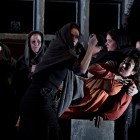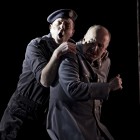Inés de Castro 2015Scottish Opera
Read more about the opera Inés de Castro
New opera is notoriously tricky, with a high failure rate. But there are some welcome exceptions and it was high time the company took another look at this excellent piece. With the composer having carried out some revisions with the declared aim of tightening it up, it is a special treat to have him conducting. In these circumstances, a completely new production was an excellent idea.
Inevitably, with nearly fifteen years passing since the last revival, the cast is new. If Stephanie Corley was looking for a meatier part to follow Hanna Glawari and Mabel in Pirates, she has certainly got her wish with the title role.
The first thing that has to be said is that the orchestral performance was quite outstanding, confirming MacMillan's mastery of mood. He is also a wonderful composer for the voice with page after page that is dramatically effective and sounds grateful to sing. The freelance chorus were clearly intensely rehearsed and gave a well projected account of themselves. The opening Stabat Mater was now sung onstage - a great benefit to its impact - indeed the choral writing is one of the glories of the score. The new staging by Olivia Fuchs dealt very simply with the narrative using a skeletal set for the first half which was to some extent dismantled during the interval battle.
The new cast did well, shedding a diferent light on several of the characteers by comparison with the previous staging. Stephanie Corley in the title role sang with intensity and also great beauty of tone. Peter Wedd as Pedro has developed into a dramatic tenor with a ringing upper range and was able to project an appropriate level of hysteria. He was costumed in 20th century battledress, a simple but effective period updating that worked well for the whole production.
Susannah Glanville made the character of Blanca both more interesting and more sympathetic than one remembered and she bacame a figure of real tragedy during the harrowing account of her miscarriages. The King, whose ineffectualness in part prompts the tragedy, was given a more youthful characterisation by Brindley Sherratt which made his eventual suicide necessary, perhaps a miscalculation when the old king should surely just have died.
Kathleen Wilkinson may not quite have the effortlessly sepulchral tones of the late Anne Collins, but she was still an affecting and moving Messenger of Death. Paul Carey Jones, usually associated here more with comedy, played Pacheco as a monstrous figure but even he generated sympathy during the narrative of the atrocities suffered during his childhood.
The short but vitally important role of the executioner was portrayed by Gary Griffiths with an appropriate sense of detachment, emphasised by his costuming as a bespecacled accountant complete with overhead projector. He must have performed this little party-piece more often than anyone else, having included it in the Opera Highlights touring programme a couple of years ago. The audience (at least during the performance at Strathmiglo), lacking the appropriate contextual background to the song, was reduced to silence, broken only by the resumption of normal service woth a Rossini aria.
The following evening saw the Theatre Royal again well-attended, and thoroughly gripped, at the six-o'clock free 'unwrapped' taster session. This one really was a bit special, in that the emphasis was on the chorus - we heard a high proportion of their long and exhausting role - with the full orchestra on hand, under Derek Clark. A real treat was provided by having the composer present to guide us through the work. This was a hugely rewarding session.
It is encouraging to find that this opera is every bit as effective as it first appeared twenty years ago, and rewards Scottish Opera's faith in reviving it, if only for four performances. Perhaps it is now time to take a second look at some of the works they premiered back in the seventies.
Performance Cast
- Inés de Castro
- First Ordinary Person
- Second Ordinary Person
- Third Ordinary Person
- Fourth Ordinary Person
- Nurse
- Pacheco adviser to the King
- King of Portugal
- Pedro Crown Prince of Portugal
- Blanca Pedro's wife
- Old Woman
- Executioner
- Young Girl
- First Child of Inés
- Second Child of Inés










